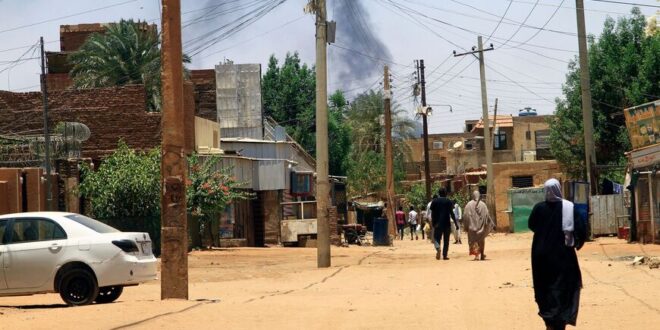In an excerpt from this week’s Security Briefing newsletter, Pentagon correspondent Jared Szuba looks at the deteriorating situation in Sudan, as the conflict between the Rapid Support Forces militia and the Sudanese Armed Forces shows no signs of slowing.
Four years after they joined hands to overthrow the decades-long rule of former dictator Omar al-Bashir, one of Sudan’s top military generals turned against the other in a violent power-grab that has brought the country’s hard-fought transition to democracy to its knees.
The Rapid Support Forces militia loyal to Gen. Mohamed Hamdan Dagalo, better known as “Hemedti,” launched an assault on the larger and better-equipped Sudanese Armed Forces under the command of his main rival and de facto head-of-state Gen. Abdel Fattah al-Burhan on Saturday.
The attempted coup d’etat – Sudan’s third since 2019 – came as the rival generals had been in talks to unite Sudan’s various military factions before future elections to restore civilian governance.
A unified army under the authority of a civilian-led government would have ended some five decades of military rule in the country of 45 million people and paved the way for sorely needed foreign aid and loans.
Instead, Hemedti – an alleged war criminal who led the Janjaweed militias during the Darfur genocide – ordered his estimated 100,000-strong RSF into a conflict with Burhan’s larger and better-equipped Sudanese Armed Forces.
The violence has left an estimated 400 people dead as of Friday and shattered hopes for Sudan’s transition to democracy. Access to Khartoum’s airport was cut off as of Thursday, with Western diplomatic staff suffering a spate of apparently random attacks by forces aligned with the RSF.
“The current fighting in Sudan could throw the country into an extended civil war,” Michael Mulroy, the Pentagon’s former top Middle East policy director, told me.
Both Hemedti and Burhan have the “internal resources to fund their efforts, and foreign backers – all factors that could contribute to a prolonged conflict,” Mulroy said.
The US military has begun positioning forces in Djibouti for a possible evacuation, but no such order had been given as of Thursday. State Department deputy spokesperson Vedant Patel said Thursday it remained “unsafe” to launch an evacuation, either from the airport or by land.
Renewed international calls for a ceasefire went out ahead of the Eid al-Fitr holiday on Friday after multiple failed attempts as both sides jockeyed for the upper hand.
Already, regional leaders appear to be putting fingers on the scales.
The Wall Street Journal reported Wednesday that Cairo had sent warplanes to back Burhan’s Sudanese Armed Forces just before fighting commenced and pilots thereafter, while Libyan warlord Khalifa Hifter had supplied the RSF with at least one planeload of munitions.
Egypt’s insistence on non-interference in the conflict is ironic, given Sisi’s history of ties to Burhan and reliance on his military bases to pressure Ethiopia over its Nile dam.
177 Egyptian troops taken captive by the RSF in Sudan were evacuated to Cairo on Wednesday after Sisi’s government gave Hemedti a 72-hour ultimatum earlier this week, according to state-controlled Egyptian press. 27 Egyptian Air Force personnel remain stuck at the embassy in Khartoum, Egypt’s army said.
The United Arab Emirates, whose leaders have relations with both sides but particularly close ties with Hemedti, took credit for negotiating the Egyptian soldiers’ release.
A US official speaking to Al-Monitor on the condition of anonymity expressed concern that foreign involvement could lead Sudan’s crisis into a Libya-like conflict.
Hemedti’s RSF has deals of arms-for-gold with Russia’s Wagner’s mercenaries. Sudan’s gold reserves (the second-largest in Africa) and its strategic location linking the continent’s interior to the Red Sea have long attracted the interest of Moscow.
Wagner airdropped a load of missiles to support the RSF in northwest Sudan, CNN reported Thursday – though that report has yet to be confirmed by other outlets. A flurry of Russian Il-76s has also reportedly been shuttling between bases used by Wagner in Libya and Latakia, Syria in the days leading up to the fighting and since it began.
So far, there appears to be no offramp for Hemedti, who remains persona non-grata in Cairo and has vowed his rival Burhan will either be captured or die “like a dog.”
 Eurasia Press & News
Eurasia Press & News




